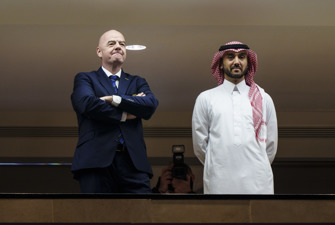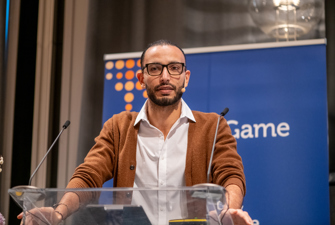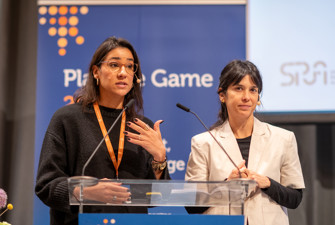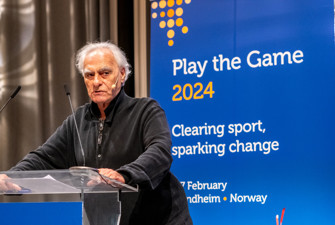"No one cares about Qatar anymore"
One year after the FIFA World Cup in Qatar ended, Andreas Selliaas visited the country to see what - if any - impact the football event had on the situation for migrant workers. He found empty buildings, empty parking lots, empty promises and that football associations have stopped caring.
Andreas Selliaas is a journalist at Idrettspolitikk.no
We walk around the stadium in Doha that was used for the final in the FIFA World Cup 2022 to see what it looks like a year after the event.
It looks dead and abandoned and the plan to settle around 200,000 residents in the newly built district on the outskirts of Qatar's capital does not seem to go according to plan.
You can still see the McDonald's sign on one of the buildings near the tram station, but the windows are dirty and boarded up, and there are no hamburgers to be had.
We arrived in an Uber and wanted, among other things, to walk all around the stadium to see what has happened to the migrant labour camp that was situated on the other side of the stadium from the main entrance.
The migrant camp was hidden from the outside world until the start of the championship in 2022, even though it was right next to the stadium.
During the championship, Samindra Kunti revealed in an article in Josimar that those who lived there were workers who provided service during the matches at the stadium and that their conditions certainly did not meet World Cup standards.
The camp was close to the site where international press and European football associations were dropped off in the years leading up to the championship to monitor the works on the stadium as part of their so-called 'critical dialogue' with the Qatari authorities.
But we did not get so far as to see what has happened to these buildings.
On the way to the camp, we noticed a large white car driving slowly after us, but at a good distance. The closer we got to the empty buildings, the faster the car drove, and we realised that we were being followed and that we would get into trouble if we continued towards the abandoned camp.
Instead, we walked faster and faster towards the exit. We crossed the road outside the car park and the white car followed us until we were at a good distance from the stadium.
This is the legacy of the World Cup in Qatar. Empty buildings, empty parking lots. And empty promises. Nobody cares anymore. Apart from security guards and police who don't want journalists trying to find out what happened in Qatar after the World Cup.
Chances for a migrant centre in Doha have fallen to less than zero
Ahead of the championship, the claim was that the football World Cup could, among other things, contribute to better conditions for the migrant workers in the country. There were approx. 2.8 million migrant workers in Qatar.
According to the International Labour Organization (ILO), there are almost 2 million left, but many of them are out of work and some have started working on the black market, for example as sex workers.
The Norwegian football president Lise Klaveness wanted to improve the conditions of the migrant workers when she addressed the FIFA congress in Doha in 2022 and on different occasions afterwards. In particular, she called for a migrant centre in Doha.
Klaveness still clings to the hope that Qatar will establish a migrant worker centre in Doha and that FIFA will contribute with compensation to migrants or migrant workers' families.
However, the chance of that happening is less than zero.
Just two weeks before we arrived in Qatar, she was in Doha with the director of the Danish Football Association (DBU) to follow up on their work with the legacy of Qatar. Yet again she came home disillusioned.
The migrant centre will never happen and the migrant workers she met where punished for meeting up with her.
Max Tunon is the head of the UN's International Labour Organization (ILO) in Qatar, and he says that only a few football associations have been to Qatar to follow up on the situation since the World Cup ended. Photo: Tariq Mikkel Khan
Just hours before we had to leave the parking lot at Lusail Stadium, we had met Max Tunon, the head of the UN's International Labour Organization (ILO) in Qatar, at their new, fancy office not far from the stadium.
As a seasoned diplomat, he elegantly warded off critical questions, but on one question he was more than clear: The migrant worker centre has never been a real option.
"I think the center per se is not part of the four-year plan. Nor was it part of the plan for the past five years," Max Tunon told us.
"So, it's not something that was initially agreed upon by the international unions and the government and the ILO for inclusion within this program."
Human Rights organisations and a few football federations feared that the centre would never materialise and now the person who could actually influence the process tells us outright that it was a non-starter.
Football associations have stopped caring
Further, Tunon told us that the few who voiced concerns before the World Cup no longer care.
"There have been a few football associations that we've engaged with over the past years. Certainly, not all. The interest from football associations varied very much. And certainly, post-World Cup, there has been only a few that we've been in touch with. The Dutch have been here in Qatar after the World Cup. The Norwegians and the Danes," he said.
"We also had a follow-up call from the German football association asking what's the latest and all that. So, there are some remaining interests from some of the football associations, but I have not heard from UEFA's working group, and it has also been a long time since there has been contact with FIFA," Tunon told us.
The day before our meeting with ILO, we spoke to migrant workers at one of the labour camps in the desert outside Doha. They were not happy that the World Cup is over.
They still risk having their savings confiscated or that they will not be paid the money they are owed by their employer if they choose to change jobs due to bad working conditions. They still have to hand in their passports to their employer, and the salary they get when they have a job is far lower than before the World Cup.
The lesson from Qatar is that reforms should start at home
Max Tunon seems happy that the World Cup is over, that all focus on the legacy of the World Cup is over, and that the pressure is now directed towards Saudi Arabia.
On the question on lessons learned from Qatar and what we should expect from the eleven years before the World Cup starts in Saudi Arabia in 2034, he replies:
"I think one of the lessons learned from Qatar is that it shouldn't be a result of FIFA pressure that these reforms are undertaken, but it should be embedded within a national strategy," Tunon outlines.
"If it comes from FIFA, then the day after the World Cup, what's the incentive for continuing it? It has to be a local rationale. Things need to be driven by national priorities in order also to get the national constituencies behind it. There was a feeling from certain quarters that these reforms were being pushed by the international community on Qatar."
Tunon is critical of the role of the FIFA when it comes to organising World Cups, and he tells them to find out what's within their control, what’s outside their control, and what is their responsibility.
"One of the things that's become very clear from Qatar is also the need to adapt to the national context. There is not a one-size-fits-all," he said.
"Already we're talking about Saudi, but every country has labour rights issues. Every country, you'll see a migrant workforce that is more vulnerable to exploitation and abuse. It shouldn't be seen as a problem in just these countries in the Middle East."
King Abdulla Sports City Stadium could be the venue for the final in the FIFA 2034 World Cup which will be hosted in Saudi Arabia. Photo: Andreas Selliaas
Saudi Arabia have the same problems as Qatar.
Some days later we sit in an empty King Abdullah Sports City Stadium in Jeddah waiting for the quarter-final match in the Club World Cup between the Egyptian team Al-Ahly FC and the Saudi home favourite Al-Ittihad FC.
This could be the stadium of the final in the World Cup in 2034.
Saudi Arabia won the right to host the Club World Cup at a board meeting of the FIFA Council earlier this year without being mentioned as a candidate beforehand and without discussion. Just as FIFA's board meeting in practice awarded the World Cup to Saudi Arabia in 2034 just a few months ago.
This club championship is part of the World Cup preparations for Saudi Arabia, and we will certainly face eleven new years of issues related to FIFA and human rights.
The question is whether we have learned anything from the run-up to the Word Cup in Qatar. And if anyone cares anymore?
The PR machinery of FIFA and the Saudi host is already in high gear.
The day before the quarterfinals of the Club World Cup, FIFA President Gianni Infantino, together with the Saudi Football President and the President of the Asian Football Confederation (AFC), attended the Premier League match between Al Ahli and Al-Ittihad in the Saudi Women's League.
FIFA did nothing to announce the match in advance or that they were going there, but willingly lined up afterwards for pre-selected media where they boasted uninhibitedly about women's football in Saudi Arabia.
For how long, we should ask.
In Qatar, they have neither a women's national team nor a separate women's league. The FIFA president doesn't talk much about that legacy today. He hardly seems to care.
The contrast between the migrant workers' living conditions in Qatar and the huge and modern stadiums, the fine, fancy and expensive hotels used by players, tourists and FIFA delegates when Qatar was in the limelight was nothing short of vulgar.
And what is happening in Saudi Arabia is no less full of contrasts. We have spoken to migrant workers in Saudi Arabia and seen how they live. And we have been to the hotels where FIFA delegates and the teams for the Club World Cup live.
A world of luxury waits for FIFA's guests at the hotels in Saudi Arabia. Photo: Andreas Selliaas
A normal salary for those migrant workers we spoke to in the outskirts of Jeddah was approximately 500 US dollars. That is the same amount as the price for one night in an ordinary hotel room at the Hilton in Jeddah, where the Brazilian team Fluminense stayed during the Club World Cup.
That’s the price you got well in advance of the tournament. If you needed the same room on the day, it would have cost approximately 2,500 US dollars. Five months' wages for a migrant worker in Jeddah.
And this is the world FIFA is now moving into. Luxury for those who are here for a short time or for the elite in Saudi Arabia and wages on the poverty line for those who facilitate those who live in luxury.
Soon the King Abdullah Sports City Stadium will fill up and the FIFA President and his Saudi hosts will be smiling nicely for the cameras, and they will be posting nice pictures on social media about what is happening here. There is something vulgar about this, too.
We now have eleven years ahead of us before we sit in the same stadium and prepare for a real World Cup match. At that time nobody will care about Qatar anymore.
The big question now is whether we will be sitting here in eleven years and still be concerned about better human rights in Saudi Arabia and a more democratic FIFA.







